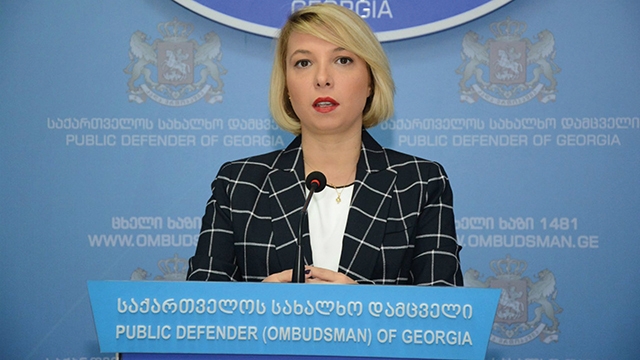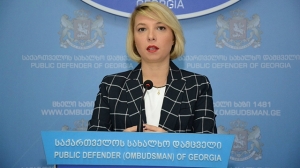Georgian Ombudsman: No Signs of Money Laundering in TBC Bank Case
Public Defender of Georgia Nino Lomjaria says that there is no evidence proving money laundering in the case of Mamuka Khazaradze and Badri Japaridze, founders of Georgia’s largest bank, TBC.
The two men were charged by the Prosecutor’s Office of Georgia (POG) on July 24, 2019 for the legalization of $16,754,000, as a result of which they received a large income. The investigation into the case was launched on 2 August.
The Ombudsman addressed Tbilisi City Court as an Amicus Curiae on the allegations against the TBC Bank founders. Her statement reads that the she is fully acquainted with the 33 volumes of the case and had identified key questions that the court should focus on before making a final decision.
To note, Amicus Curiae (a friend of the court) is an interested person who is not a party to a case under review and who may submit to the court his/her own written opinion with regard to the case.
The document released by the Ombudsman discusses why money laundering is a crime of convention origin, what specific prerequisites, scheme and purpose are needed to commit this crime and why the relevant norm of the Criminal Code should be interpreted according to its autonomous content.
“Following legal analysis, the Amicus Curiae's opinion deals directly with the case of Mamuka Khazaradze and Badri Japaridze. The case materials do not contain the elements necessary for assessing the action as a crime of money laundering," the statement reads.
Lomjaria believes that a number of circumstances are necessary for an action to be considered a money laundering crime. According to her, prior to the process of legalizing illicit income, it is necessary to have illegally obtained "black money.”
“A predicate crime usually involves regular, repeated crimes. In the present case, however, it does not appear to involve at least one such repetitive, or at least one pre-existing, predicate offense,” the Public Defender stated.
Lomjaria explains that in general, a money laundering scheme consists of three stages. First, money obtained by committing a crime is usually deposited into various bank accounts, after which many petty transfers are carried out so that the controlling authorities can no longer track the origin of the money, and finally the money is returned to the offender's bank account.
“According to the case materials, the defendants did not place the money into various accounts. Nor did they, in order to avoid paying taxes, carry out petty transfers, and in this case, there is no evidence of their having the money returned to their accounts at all,” she said.
The document released by the Public Defender’s Office was presented by Khazardze’s lawyer Zviad Kordzadze at the trial of the case at Tbilisi City Court on January 15.
When charging Khazaradze and Japaridze last year, the POG said in April-May 2008 the TBC Bank gave $17 million to LTDs Samgori M and Samgori Trade as a loan and on the same day the money was placed into the private bank accounts of Khazaradze and Japaridze. The agency claims that in October-November 2008, so that the companies did not have to start covering the interest rate for the loan, they were given one more year to close the loan, without provision of reason, and on 31 December 2008, the bank wrote off the debt without demanding the real estate provided by the LTDs as a guarantee or the payment of money by the guarantors.
The Prosecutor’s Office says in 2012 the bank fully freed the LTDs from the financial obligations, adding later the LTDs were replaced with a company registered offshore, which had no financial actives in Georgia.
Khazaradze and Japaridze claim they were forced to leave the bank, adding that the investigation is “absurd,” aimed at discrediting the bank and affecting the country’s economic image. The two men claim the transaction in 2007-2008 took place within full compliance of the law, and the leading financial institutions confirmed this in their audit.
Khazaradze, who is now the head of the opposition Lelo movement, calls the case politically motivated and links it to the Anaklia Port project, which was canceled after the government terminated the contract with Anaklia Development Consortium, where TBC Bank was the leading partner.
By Tea Mariamidze
Image source: Netgazeti












